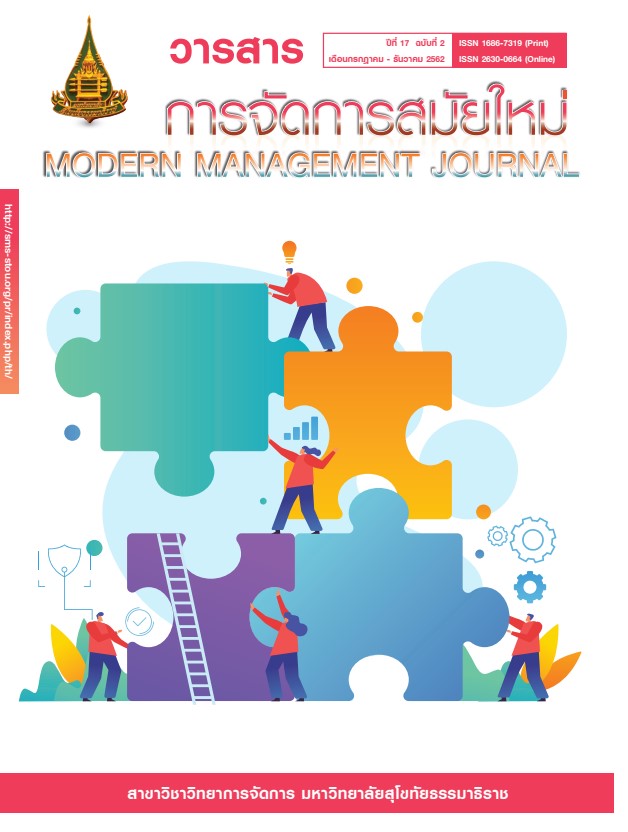FACTORS AFFECTING INNOVATION BEHAVIOR OF PATENT AND PETTY PATENT APPLICANTS
Keywords:
Innovation Behavior, Patent, Petty PatentAbstract
Literature on individual’s differences reveals that personal characteristics influence innovative behaviors among individuals. To further examine this phenomenon, this study explores how personal characteristics of individuals applying for patents and petty patents have impact over their innovative behaviors. A number of previous studies focused on personal characteristics and innovative behaviors among employees in workplaces but none of them focused on patent and petty patent applicants and their innovative behaviors. This study aims to fill this gap using the theoretical lens of innovation behavior, social networks, open-mindedness, creative thinking and self-efficacy employing the mixed methodology approach with the use of questionnaires and in-depth interviews. The total of 397 applicants filled closed ended questionnaires that were given out to only the applicants who had applied for patents and petty patents at the Department of Intellectual Property, Thai Ministry of Commerce. In addition, at least 21 of these applicants were interviewed to get a deeper understanding of creative thinking and self-efficacy among the participants. The results revealed that personal characteristics of the applicants of patents and petty patents do influence innovative behaviors
References
Bandura, A. (1977). Social Learning Theory. New Jersey: Prentice – Hall.
Boissevain, J. (1974). Friends of Friends: Network, Manipulators and Coalitions. Oxford: Basil Blackwell.
Casimir, G., Lee, K., & Loon, M. (2012). Knowledge Sharing: Influences of Trust, Commitment and Cost. Journal of Knowledge Management, 16(5), 740-753.
Denti, L., & Hemlin, S. (2012). Leadership and Innovation in Organizations: A Systematic Review of Factors that Mediate or Moderate the Relationship. International Journal of Innovation Management, 16(03), 1240007.
Department of Intellectual Property. (2019). The Definition of Paten and Petty Patent. Retrieved from https://www.ipthailand.go.th/en/faq.html
Eydmak, K., Sukno, K., Dangmang, J., Wongkam, S., Buripat, V., & Lungtakul, S. (2018). Innovation Behavior of Personnel in Prince of Songkla University. Walailak Research Journa, 10(1), 1-7. [In Thai]
Haiman, F.S. (1964). A Revised Scale for the Measurement of Open Mindedness. Communication Monographs, 31(2), 97-102.
Hare, W., & McLaughlin, T. (2008). Four Anxieties about Open‐Mindedness: Reassuring Peter Gardner. Journal of Philosophy of Education, 32(2), 283-292.
Janssen, O. (2000). Job Demands, Perceptions of Effort-Reward Fairness and Innovative Work Behavior. Journal of Occupational and Organizational Psychology, 73, 287-302.
Kleysen, R.F., & Street. C.T. (2001). Towards a Multi-Dimensional Measure of Individual Innovative Behavior. Journal of Intellectual Capital, 2(3), 284-296.
Kratzer, J., Meissner, D., & Roud, V. (2017). Open Innovation and Company Culture: Internal Openness Makes the Difference. Technological Forecasting and Social Change, 119, 128-138.
Phung, V.D., Hawryszkiewycz, I., Chandran, D., & Ha, B.M. (2017). Knowledge Sharing and Innovative Work Behavior: A Case Study from Vietnam. Australasian Conference on Information Systems, Hobart: Australia, 1-11
Saekhow, T. (2014). Organizational Factors Affecting Innovative Behavior in Working to Support the ASEAN Economy in Meat Processing Industry in Bangkok and its Vicinity (Master’ thesis). Bangkok University.
Schunk, D.H. (2004). Learning Theories: An Educational Perspective. Upper Saddle River, Pearson Prentice Hall.
Setabut, T. (2012). A Study of Competency Needs of Human Resource Staff for Industry Sector. Veridian E-Journal, 5(2), 426-448. [In Thai]
Skerzyski, P., & Gibson.R. (2008). Innovation to the Core: A Blueprint for Transforming the Way Your Company Innovates. Boston: Harvard Business School Press.
Perry-Smith, J.E., & Shalley, C.E. (2013). The Social Side of Creativity: A Static and Dynamic Social Network Perspective. Academy of Management Review, 28(1), 89-106.
Sutawat, S. (2015). Factors Affecting Personal Innovation Behavior in the Basic Commission Office. The Veridian E-Journal, 11(2), 530-545. [In Thai]
Thapapal, D. (2018). Behavioral Patterns, Creativity and Innovation of Personnel in Thai Business Organizations. Academic Journal, Bangkok Thonburi University, 7(1), 180-193. [In Thai]
West, M.A., & Farr, J.L. (1989). Innovation at Work: Psychological Perspectives. Social Behavior, 4,15-30.



